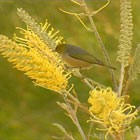Australia has some of the world’s most beautiful birds, and it’s easy to encourage them to stop over at your place for a visit. Simply provide food, shelter and fresh water and the birds will do the rest for you!
Bird-friendly garden checklist
Grow Australian native plants such as grevilleas, banksias and bottlebrush, but go for a range of sizes and types to provide food and shelter for a variety of birds. Make sure there’s something in flower every month of the year in your garden. Some exotic plants are OK for birds. Provide clean, fresh water in a birdbath, and make it part of your routine to replace the water regularly. Site the birdbath so you can enjoy the show, but also make sure the birdbath is safe from attack by predators. Offer food such as a good quality commercial mixed bird seed or nectar mix.
Bird-attracting natives
There’s no shortage of great native plants to choose from, so plant a variety.
Grevilleas
Grevilleas have nectar-laden flowers that attract honeyeaters and many other native birds. Many flower for most of the year. Grevilleas are available in different sizes, from groundcovers and tiny shrubs to large trees. Don recommended Grevillea ‘Red Hooks’ (formerly known as Grevillea hookeriana), as a very good bird attractor. It has bright red, toothbrush-type flowers for most of the year. Grevillea intricata, a dense shrub to 2m tall, is a classic nesting plant for little birds such as wrens. Golden Yul-Lo (Grevillea ‘Golden Yul-lo’) is a big grevillea to 3m (10’), which bears masses of bright yellow, bottlebrush flowers all year. These flowers are very attractive to birds (such as rainbow lorikeets and crimson rosellas) and bees.
Banksias
Many species of nectar-laden banksia flower in winter when other natural food sources are scarce. Top choices for gardens include Banksia integrifolia, which reaches 15m, or B. spinulosa (0.5-3m).
Tea trees
Leptospermum species and cultivars put on an outstanding flower show at various times of year, depending on the variety. They also attract insects, which in turn attract insect-eating birds.
Flannel flowers
These plants have lovely grey foliage contrasting with white to cream flowers, which blend well with rocky areas in the garden. Some of the local parrots enjoy eating flannel flower seeds.
Wattles
There is a wide array of wattles to choose from, ranging from groundcovers to shrubs and trees. Birds are attracted to their seed capsules. Try to plant a local variety, as some wattle species can become weedy.
Casuarinas
Seed lovers such as black cockatoos and red-browed finches feast on she-oaks (Casuarina spp.) and forest oaks (Allocasuarina torulosa). These tough, evergreen trees tolerate a variety of soils.
Further information
See ‘Backyard Birds’, a free booklet attached to the back of the September edition of the Burke’s Backyard Magazine. The book has all the information you need to create a garden that attracts, feeds and shelters our beautiful native birds.
While some of the plants mentioned in our segment may grow well in your area, others may not. You can obtain advice on suitable plants for your climate and conditions at a specialist native plant nursery, for example:
NSW
Annangrove Grevilleas Native Nursery, Kenthurst. Phone: (02) 9654 1380
Cranebrook Native Nursery, Cranebrook. Phone: (02) 4777 4256
Palm Land & Sydney Wildflower Nursery, Terrey Hills. Phone: (02) 9450 1555
Sydney Wildflower Nursery West, Marsden Park. Phone: (02) 9628 4448
Sydney Wildflower Nursery South, Heathcote. Phone: (02) 9548 2818
QLD
Fairhill Native Plants, Yandina. Phone: (07) 5446 7088
Nielsen’s Native Nursery, Loganholme. Phone: (07) 3806 1414
VIC
Kuranga Native Nursery, Ringwood. Phone: (03) 9879 4076
Mt Cassell Native Nursery, Pomonal. Phone: (03) 5356 6351
SA
Nellie Nursery, Mannum. Phone: (08) 8569 1762
WA
Zanthorrea Nursery, Maida Vale. Phone: (08) 9454 6260



